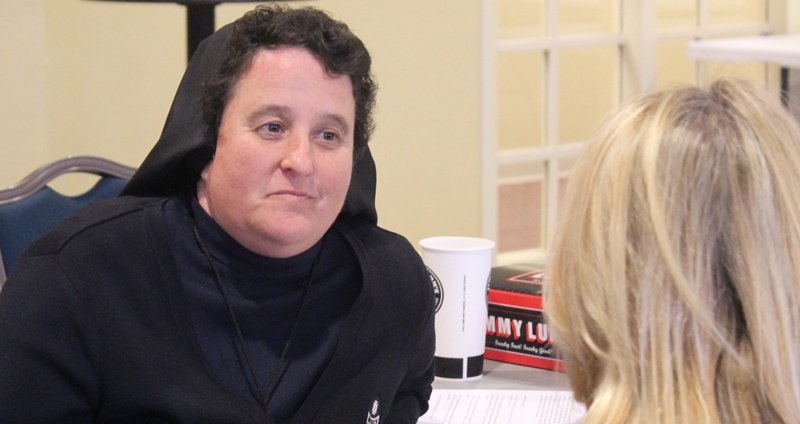
COLUMBIA—Sister Mariana Koonce takes health care into the valleys and byways of the Tennessee mountains. She regularly sees people living in dire circumstances, often without adequate shelter or running water, and hears stories of poverty and family despair.
Despite all the challenges, she finds joy in sharing the message of the Gospel with those she treats.
She is a family physician and a member of The Religious Sisters of Mercy in Alma, Mich., and works in the Diocese of Knoxville at St. Mary’s Legacy Clinic, a mobile clinic that provides free health care to people in rural areas.
Sister Mariana spoke to a group of people who attended the annual White Mass and physicians’ conference held Oct. 24 at St. Peter Church.
Bishop Robert E. Guglielmone celebrated the liturgy, which is meant to be a time for health care professionals to pray together and gain spiritual strength for their work.
Her topic was “The Gospel of Life is the Gospel of Joy,” and focused on the message of the sanctity and value of all human life in St. John Paul II’s 1995 encyclical “Evangelium Vitae.”
She said that true joy is not “giddy happiness,” but comes through pursuing the greater good portrayed in the Gospel through work and commitment.
Catholic doctors and nurses, she said, have a prime opportunity to know true joy because they pursue their profession after years of schooling and grueling training, and their work involves caring for those who God created in His image.
“We can rejoice in the divine good through how we participate in it, and looking at what God has created, how can we not rejoice in His goodness?” she said.
Sister Mariana acknowledged that any joy and inspiration found in medical work is also tempered by the challenges of a secular world.
“We are supposed to be the prime evangelizers of the Gospel and culture of life, and that goes against the tide of our throwaway culture,” she said. “We live in a world that often looks on a child in the womb or a person who is disabled as a problem. We can never say a person is a problem.”
She said Catholics in health care must deal with threats to religious freedom as they are increasingly pressured to participate in or condone practices like abortion, sterilization and artificial contraception. Frequent prayer, attendance at daily Mass and adoration of the blessed sacrament, if possible, can help them stay committed to their work. She also encouraged the doctors and nurses to frequently examine their consciences and their practices to make sure they are not participating in methods that go against Church teaching.
Offering a daily witness of faith is often difficult in sterile clinic atmospheres, she said, but something as simple as wearing a crucifix can give a patient silent evidence of God’s love, the doctor’s faith and even the sanctity of suffering.
Sister Mariana said the Holy Year of Mercy, which begins on Dec. 8, offers health care workers the chance to focus on the Gospel message. She encouraged them to focus on the needs of each patient, and work to “meet and see Christ” in everyone they encounter.
Miscellany photo/Christina Lee Knauss: Sister Mariana Koonce of The Religious Sisters of Mercy talks with Ellen Mongan, from Aiken, during the physicians’ conference held at St. Peter Church in Columbia on Oct. 24.

